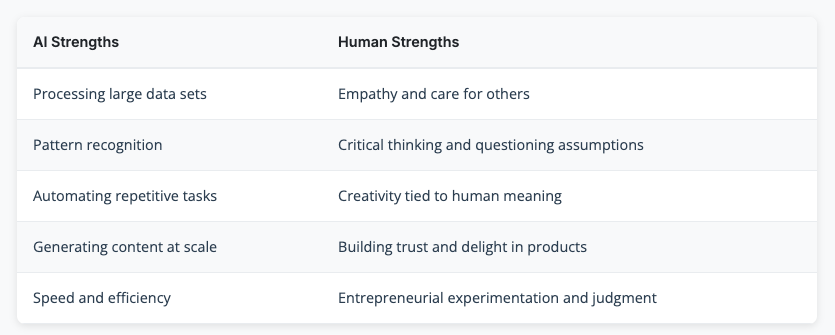Why Empathy, Not IQ, Defines Success in the AI Age
Walk into any workplace today, and you’ll see AI embedded in daily tools and workflows. It drafts emails, generates reports, and even proposes design ideas. What it can’t do is sit across from someone, understand their frustration, and respond with care. That distinctly human capacity is becoming the true differentiator.
Carnegie Mellon professor Po-Shen Loh puts it bluntly (video): “The only sustainable trait in the age of AI is the ability to care about people and act on it.”
Machines can replicate knowledge and pattern recognition, but they cannot genuinely understand what it feels like to be human. That gap is where the next era of value will be created.
Empathy as a Competitive Advantage
For product managers and technologists, this is more than philosophy. Empathy drives the ability to design experiences people love, not just tolerate.
A recommendation system can suggest content, but only a team that understands user frustration can simplify onboarding. A chatbot can answer questions, but only a product leader attuned to customer anxieties will build trust into its design.
“Creativity isn’t unique anymore. Empathy and delighting others are what truly matter.”
The Role of Critical Thinking
Loh also warns that in a world overflowing with AI-generated content, the ability to question, validate, and synthesize ideas is critical.
“We must not let AI replace our thinking. We must train ourselves to think, critique, and analyze.”
For product leaders, that means not just interpreting data but challenging its assumptions. What problem are we solving, and for whom? Why now? These are not questions an algorithm can fully answer.
An Entrepreneurial Mindset
Finally, there’s the entrepreneurial stance—an openness to try, fail, and adapt quickly. Loh encourages constant questioning and self-critique, a habit that prevents complacency in the face of AI’s rapid progress.
For product managers, that translates into running small experiments, engaging with real users, and resisting the comfort of static roadmaps.
Takeaways for Product Leaders
Lead with empathy: Prioritize understanding over efficiency when shaping products.
Question everything: Treat AI outputs as inputs, not truths.
Experiment constantly: Build resilience by testing ideas in the market, not just in the lab.
What AI Does Well vs. What Humans Do Uniquely Well
The lesson is clear. Success in the AI era isn’t about out-thinking the machine. It’s about leaning into the one trait it cannot replicate: the ability to care about people.


